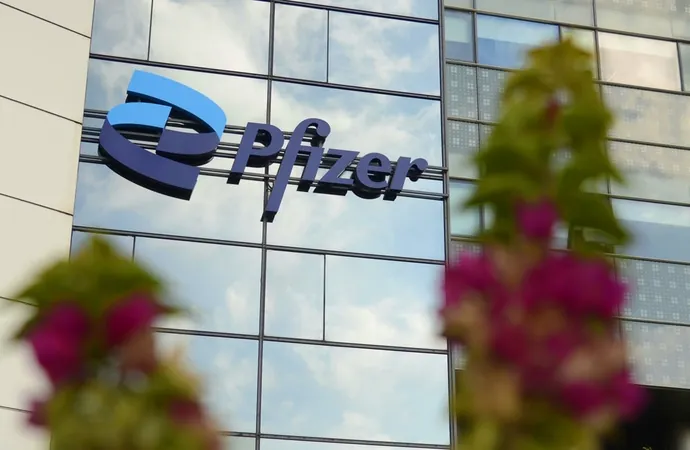
Pfizer Breakthrough: Promising Results in Phase II Trial for Cancer Cachexia
2024-09-30
Pfizer Breakthrough: Promising Results in Phase II Trial for Cancer Cachexia
In the latest developments from the pharmaceutical world, Pfizer has made headlines with positive topline data from its Phase II trial of ponsegromab, a monoclonal antibody treatment aimed at combatting cancer cachexia, a severe condition marked by weight loss and muscle wasting often seen in cancer patients. The promising results unveiled a 16-point leap in the Phase Transition Success Rate (PTSR), advancing to a 42% probability of progression through clinical stages.
This breakthrough was presented at the prestigious European Society for Medical Oncology (ESMO) 2024 Congress held on September 14. The study (NCT05546476) specifically assessed ponsegromab's efficacy, safety, and tolerability against a placebo, focusing on body weight changes among patients diagnosed with cancer cachexia.
Cachexia presents a substantial challenge, as it cannot be reversed merely by increasing caloric intake. However, the trial results indicated a noteworthy 5.6% average weight gain at the highest dose after just 12 weeks of treatment. Notably, the incidence of treatment-related adverse events was low, at 7.7% for ponsegromab patients compared to 8.9% for those taking placebo. Given these encouraging findings, Pfizer is in discussions to begin registration-enabling studies for ponsegromab in 2025.
In addition to its cancer cachexia research, Pfizer is also exploring ponsegromab's effects on heart failure in another Phase II trial (NCT05492500), hinting at the drug's potential to tackle multiple serious conditions.
Merck's Keytruda Scores Big: Increased Success Rate in Thymic Carcinoma
In other exciting news, Merck's renowned immunotherapy, Keytruda (pembrolizumab), has seen a substantial rise in its PTSR for thymic carcinoma, now recorded at 43% following a successful presentation of Phase II study outcomes. The PECATI trial (NCT04710628) revealed impressive results in treating patients with pre-treated thymic carcinoma and B3-thymoma, showing exceptional five-month progression-free survival rates of 91% and one-year overall survival rates at 85%. Such results solidify Keytruda's status as a leading treatment option, especially with substantial projected sales figures exceeding $34 billion by 2027.
Teva’s Austedo Achieves Landmark in Dystonia
Teva Pharmaceuticals, known for its contributions to neurological treatments, reported a 56% PTSR for its drug Austedo (deutetrabenazine) following the completion of a Phase II trial. This study assessed Austedo's safety and tolerability for adults with dystonia, a movement disorder characterized by involuntary muscle contractions. Initially approved by the FDA for other indications like Huntington’s disease, Teva's continuous research signifies a dedication to offering more options for clinical management of neurological conditions.
Setbacks for IMPACT Therapeutics and Acrotech Biopharma’s Trials
However, not all news is positive; IMPACT Therapeutics faced a significant setback with its senaparib trial, experiencing an 11-point decrease in its PTSR to a mere 9% after its Phase II study was terminated. The trial's aim was to combine senaparib with irinotecan, but it fell short due to safety concerns.
Meanwhile, Acrotech Biopharma’s Beleodaq, designed to treat diffuse large B cell lymphoma, saw its PTSR decrease by 34 points to 36% following the suspension of its Phase I trial due to pending amendments required by the National Cancer Institute.
Conclusion: A Mixed Bag of Advances and Challenges in Cancer Drug Development
As we delve deeper into these trial outcomes, it’s clear that while exciting progress is on the horizon—especially with Pfizer, Merck, and Teva leading the charge—challenges continue to loom around other promising therapies. These developments underscore both the hopes and hurdles that accompany the quest for groundbreaking treatments in oncology and neurology. Stay tuned for continuous updates on these revolutionary advancements in medicine!



 Brasil (PT)
Brasil (PT)
 Canada (EN)
Canada (EN)
 Chile (ES)
Chile (ES)
 España (ES)
España (ES)
 France (FR)
France (FR)
 Hong Kong (EN)
Hong Kong (EN)
 Italia (IT)
Italia (IT)
 日本 (JA)
日本 (JA)
 Magyarország (HU)
Magyarország (HU)
 Norge (NO)
Norge (NO)
 Polska (PL)
Polska (PL)
 Schweiz (DE)
Schweiz (DE)
 Singapore (EN)
Singapore (EN)
 Sverige (SV)
Sverige (SV)
 Suomi (FI)
Suomi (FI)
 Türkiye (TR)
Türkiye (TR)